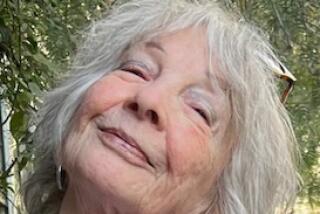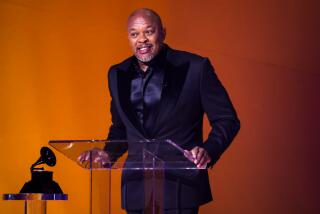Three Strokes With Jarvik-7 : Family Hopes Schroeder’s Extra Year Was Worth It
- Share via
LOUISVILLE, Ky. — For most of every day, Margaret Schroeder sits by her husband’s bedside in the simple hospital room. She talks to him and holds his hand, coaxing him toward recovery from his third severe stroke.
She also searches his face for a sign that he, too, believes the extra year of life has been worth the ordeal.
Twelve months ago today, her husband, William J. Schroeder, a father of six from Jasper, Ind., became the second person in history to receive a permanent artificial heart.
So far, that Jarvik-7 heart, which replaced a diseased natural organ hours before it would have failed, has beaten more than 39 million times. It has kept him alive longer than any other mechanical heart patient, but his doctors say it also probably has been responsible for three strokes--the first just 18 days after the implant and the most recent two weeks ago.
“I have seen four seasons from that window,” Margaret Schroeder said in an interview here last week. “It’s so long that I don’t remember anything else but just being with Bill up there in that room. When I first came here, I thought it was going to be like a roller coaster--if we could just get across that hump we’d be OK. But we keep going to the top and falling back down again.”
Medical complications during Schroeder’s long survival have sparked a worldwide debate among doctors and ethicists about the quality of life for recipients of permanent artificial hearts. Some believe the risk of strokes and brain damage may not be worth the extra months of life.
The family members, interviewed as the first anniversary of the operation approached, wish they had asked Schroeder before the operation what he thought.
Margaret Schroeder said she looks at her husband and wonders: “How far down the line does he want us to go?”
“We’ve done a lot of things we wouldn’t have gotten to do in this last year if we wouldn’t have gone ahead with this operation,” she said, listing picnics, fishing outings and birthday parties.
“He still has had that whole year. To me, a year in a wheelchair is a lot better than six feet under the ground. But for Bill, I don’t know whether he’s gone through hell or not.”
She has even tried to ask him. “I say, ‘Honey have you had enough? Is it too bad? Are you in pain?’ He never indicates that it’s too much or that he doesn’t want to go on. I think if he didn’t want to go ahead he would let me know by blinking his eyes or squeezing my hand. I feel he would give me a signal.”
Cries Sometimes
Schroeder’s son, Mel, 31, wishes his father could tell them what he wants. “I hate to be in a position of trying to decide for someone else,” Mel said during an interview in Jasper.
“When you go in to visit him, he cries sometimes,” Mel said. “Maybe he’s happy to see us, or maybe he feels bad because we’ve left our family to come see him. There are all sorts of things you can read into it.”
Mrs. Schroeder also wishes they had thought more seriously before the operation about what they should do if he had a stroke. He would still have had the operation, she said, but “it would be so much simpler if he had written down what he wanted. Bill didn’t know that he’d be like this after each stroke. He thought he would get better or die.”
Schroeder and his family were thrust into the news the day after Thanksgiving last year, when Dr. William C. DeVries and the Humana Heart Institute International announced that the retired munitions-plant worker had been selected to receive the heart.
Clark the First
Two years before, DeVries had implanted an artificial heart in Barney Clark, a 61-year-old Seattle-area dentist. Clark survived 112 days, never leaving the hospital, and died after several of his other organs failed.
Schroeder and Murray P. Haydon, who received his artificial heart in Louisville nine months ago, are the only men living today with mechanical hearts. Others who have received permanent artificial hearts include Jack Burcham, who died 10 days after his April operation in Louisville, and Leif Stenberg, who survived seven months after his April operation in Sweden.
Schroeder, 53, is regaining the ability to move his arms and legs but remains unable to speak. Last week, Mrs. Schroeder said, “he squeezed my hand for the first time” since the latest stroke.
Mel Schroeder and Terry Schroeder, 26, said the year was marked by a few powerful high points: Schroeder dressed up in his tuxedo for Terry’s wedding; Schroeder holding a grandchild born just five months ago and waving to a cheering throng that welcomed him during a brief visit to Jasper.
Financially Draining
The ordeal, though, has been physically and financially draining as well. The children, ages 20 to 32, have made the 90-mile trip from Jasper to Louisville hundreds of times. Some of their monthly phone bills run $100 or more.
Mrs. Schroeder has lost weight and recently had fainting spells caused by exhaustion. Doctors sent her home to Jasper for a few weeks’ rest, saying she had been so wrapped up in her husband’s health that she had not paid enough attention to her own.
She said she is feeling better, but being forced to stay in Jasper, away from her husband and the hospital, was difficult. “I’m a worrywart,” she explained. “I don’t like to leave him.”
When she becomes depressed, Mrs. Schroeder said, she thinks of the contributions made by her husband’s experience. He had hoped the artificial heart would allow him to return to a relatively normal life. But if that did not happen, his wife said, he hoped DeVries and his implant team would learn something.
‘Still Learning’
“I have to believe that they’ve learned an awful lot from Bill, and they are still learning,” she said. “I hope Bill understands that it’s worth it. I like to think that because of Bill they are able to use the heart as a bridge,” or temporary device until a donor human heart is available for transplant.
The Schroeders have received several thousand letters during the last year. Some offer words of encouragement; others say Schroeder’s courage has been an inspiration. Mrs. Schroeder reads them to her husband.
The family’s worst moment during Schroeder’s rocky year came six hours after the implant, when he was rushed back into the operating room to stop excessive bleeding. Although that initial setback had no lasting effect, it made a lasting impression on the family.
“Everybody was so excited and so high after the operation,” said Mel, an engineer.
The setback “brought us right back down,” said Terry, a meat packing plant worker.
It also set a tone. “We never got too high after that,” Mel said.
Filled With Promise
Schroeder’s first 18 days with the heart were filled with promise. For months, his failing natural heart had left him bedridden. Suddenly, with a new mechanical heart, he was walking, sipping a beer, joking with doctors and laughing.
But then a stroke partially paralyzed him. At first, he lost some of his memory and his ability to speak. He has never fully regained either, but after four months he was released from Humana and became the first artificial heart patient to live outside the hospital.
He and Margaret lived in a specially equipped apartment across from the hospital. He was hospitalized after a second stroke in May, returned to the apartment in August, and was hospitalized again earlier this month after the third stroke.
Although Schroeder’s condition has deteriorated over the course of the year, there have been good moments, Mel Schroeder said. “Sometimes you have to wait awhile, but then something will come up and you can tell he’s enjoying it. That one day, or one hour, makes up for the bad times.”
While he was able to live in the apartment, his wife said, he sometimes washed the dishes, played cards or leafed through scrapbooks.
‘Having Him With Me’
“It wasn’t all bad,” she said. “To me, having him with me for that year was good. I can’t answer for Bill. Maybe the bad for him was more than the good.”
The Schroeders still appear to be the solid, supportive Midwestern family that appealed to the screening committee at Humana. But they have spent a year in the international spotlight, appearing on television talk shows and ethics panels.
They say Schroeder would want them to let the world know how he is doing--whether the news is good or bad. “It seems unreal to see me--someone from a little town like Jasper--on television,” Mrs. Schroeder said. “But I’m thankful the media gave us the chance to let Bill be shared.”
The family has wondered how much longer Schroeder can endure the setbacks. “Anytime you can keep somebody with you, you don’t want to give him up,” Mrs. Schroeder said. “Whether it’s five years or one year, I still want Bill with me as long as I can have him.”
‘Full Speed Ahead’
DeVries acknowledged that “the quality of his life is probably not what he would want. But by all indications (he) is still going on with the experiment and is kind of, damn the torpedoes, full speed ahead.”
“As long as Bill continues to fight,” his wife said, “we’re going to back him up all the way. Sometimes we’ll cry and sometimes we’ll laugh, and we’ll just sort of stick together.
“That’s the way we started out in the beginning, and that’s the way we want it to end. If it ends.”
More to Read
Sign up for Essential California
The most important California stories and recommendations in your inbox every morning.
You may occasionally receive promotional content from the Los Angeles Times.














